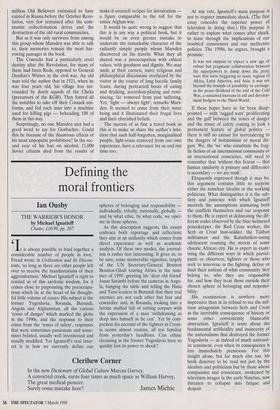Defining the moral frontiers
Ian Ousby
THE WARRIOR'S HONOR by Michael Ignatieff Chatto, f10.99, pp. 207 It is always possible to bind together a considerable number of people in love,' Freud wrote in Civilization and Its Discon- tents, `so long as there are other people left over to receive the manifestations of their aggressiveness.' Michael Ignatieff is right to remind us of this sardonic wisdom, for it comes close to pinpointing the preoccupa- tions which lie at the heart of his thought- ful little volume of essays. His subject is the former Yugoslavia, Rwanda, Burundi, Angola and Afghanistan, all the various `zones of danger' which marked the globe in the 1990s, and the response to their crises from the 'zones of safety', responses that were sometimes passionate and some- times belated, usually well intentioned and usually muddled. Yet Ignatieff s real inter- est is in how we currently define our spheres of belonging and responsibility individually, tribally, nationally, globally and by what ethic, by what code, we oper- ate in those spheres.
As this description suggests, the essays embrace both reportage and reflection; they aim at an authority which comes from direct experience as well as academic analysis. Of these two modes, the journal- ism is rather less interesting. It gives us, to be sure, some memorable vignettes, largely of the UN Secretary-General Boutros Boutros-Ghali touring Africa in the sum- mer of 1995: greeting his 'dear old friend' Jonas Savimbi before the cameras in Ango- la, banging the table and telling the Hutu and Tutsi leaders in Burundi that their real enemies are not each other but fear and cowardice and, in Rwanda, looking into a latrine stuffed full of rotting corpses with the expression of a man 'withdrawing as deep into himself as he can'. Yet by com- parison his account of the fighters in Croat- ia seems almost routine, all too familiar from yesterday's headlines. Can ethnic cleansing in the former Yugoslavia have so quickly lost its power to shock? At any rate, Ignatiefrs main purpose is not to register immediate shock. (The first essay concedes the superior power of television in doing that.) His purpose is rather to explore what comes after shock, to tease through the implications of our troubled consciences and our ineffective policies. The 1990s, he argues, brought a promise: It was not utopian to expect a new age of robust but pragmatic collaboration between the superpowers to damp down the proxy wars that were beggaring so many regions of Africa, Latin America, and Asia; it was not beyond the bounds of possibility to envisage, in the peace-dividend of the end of the Cold War, a sustained increase in aid and develop- ment budgets to the Third World.
If these hopes have so far been disap- pointed — with 'ragged wars' proliferating and the gulf between the zones of danger and the zones of safety coming to look a permanent feature of global politics there is still no excuse for surrendering to the dangers of isolationism or moral dis- gust. We, the 'we' who constitute the frag- ile fiction of an international community or an international conscience, still need to remember that 'without this fiction — that human similarity is primary and difference is secondary — we are sunk'.
Eloquently expressed though it may be, this argument contains little to surprise either the armchair idealist or the working politician. What distinguishes it is the sub- tlety and patience with which Ignatieff unravels the assumptions animating both the conflicts themselves and our response to them. He is expert at delineating the dif- ferent codes observed by the blue-helmeted peacekeeper, the Red Cross worker, the Serb or Croat foot-soldier, the Taliban militiaman and the Kalashnikov-toting adolescent roaming the streets of some chaotic African city. He is expert in exam- ining the different ways in which partici- pants or observers, fighters or those who seek to intervene in the fighting, define or limit their notions of what community they belong to, who they are responsible for, and how they treat those outside their chosen sphere of belonging and responsi- bility.
His examination is nowhere more impressive than in its refusal to see the mil- itant antagonism between Serb and Croat as the inevitable consequence of history or some other conveniently blameable abstraction. Ignatieff is acute about the fundamental artificiality and insincerity of the nationalisms that destroyed the former Yugoslavia — as indeed of much national- ist sentiment, even when its consequence is less immediately pernicious. For this insight alone, but for much else too, his book deserves to be read not just by the idealists and politicians but by those whose compassion and conscience, awakened by television images in the early Nineties, now threaten to collapse into fatigue and despair.


























































 Previous page
Previous page